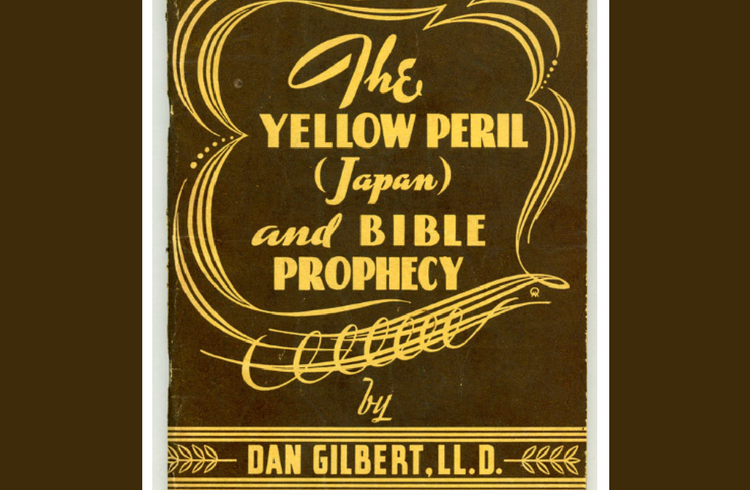As my friend and I scanned the covers and bindings of discarded Christian books on a table, available for the taking, we ran across The Truth About Juvenile Delinquency by Dan Gilbert (Zondervan, 1943). The back cover listed other titles by Gilbert, including this racist one: The Yellow Peril (Japan) and Bible Prophecy (Zondervan, 1943).
Since I know a bit about Zondervan, I decided to try and figure out who Dan Gilbert was. In The House of Zondervan: Celebrating 75 Years, Jim Ruark describes Gilbert as the young associate editor of the National Republic magazine in Washington, DC, and destined to be “the William Jennings Bryan of his day” (p. 46). Gilbert saw Japan “plainly and unmistakably” in Revelation 9 and 16. He penned several other titles, mostly with premillennial eschatological themes, assigning biblical roles to Russia as well as Japan.
The Peril of Christian Nationalism
Dan Gilbert was a product of his time. He read the Bible, as many still to do, with the United States of America being central. Such an understanding of Scripture is part of Christian nationalism.
Christian nationalism might be defined as the belief that Christians have been called by God to create a Christian nation. Author Michelle Goldberg notes that according to one Christian nationalist,
Christians have an obligation, a mandate, a commission, a holy responsibility to reclaim the land for Jesus Christ — to have dominion in civil structures, just as in every other aspect of life and godliness…It is dominion we are after. Not just influence.
Christian nationalism is not only behind how some Christians understand the book of Revelation; it impacts their politics as well as their views of other human beings. The genocide perpetrated against Native Americans, the enslavement of Africans, the fear of those who did not grow up Christian (especially Muslims at this point in history), debasement of women, as well as ongoing discrimination of various ethnic minorities, is linked to Christian nationalism. It is not merely coincidence that the most notoriously racist and segregated parts of the country are found in the so-called “Bible Belt.”
The New Testament regularly and forthrightly describes God’s love for all humanity as well as God’s desire for all different kinds of people to be united (e.g., Matt 28:19-20; John 3:16; Acts 10:34-35; Ephesians 2:11-22). The apostle Peter’s words in that Acts passage are especially noteworthy in their direct challenge to Christian nationalism:
I now realize how true it is that God does not show favoritism but accepts from every nation the one who fears him and does what is right. Acts 10:34-35
Yet, despite the New Testament’s resistance to any kind of favored nation status, Christian nationalism persists and fosters division in that it distorts the message of Jesus found in the New Testament. It was Christian nationalism that gave rise to a Dan Gilbert and his racist, fear-mongering books, and continues to undergird divisive behavior that taints Christian witness and supports white supremacy. Despite the New Testament’s resistance to any kind of favored nation status, Christian nationalism persists and fosters division in that it distorts the message of Jesus found in the New Testament. Click To Tweet
Christian Nationalism is Not Biblical
Christian nationalism is about how Christians read and understand the Bible. The current political climate has brought discussion of Christian nationalism to the foreground. White evangelicals’ unwavering support for President Trump is the result of Christian nationalism.
Recently, three sociologists, in an article in the Washington Post, offered an explanation as to why, “both white mainline and evangelical Protestants continue to approve of Trump as president at higher levels than other religious groups.” Their own study demonstrated that “voter’s religious tenets aren’t what is behind Trump support; rather it’s Christian nationalism—their view of the United States as a fundamentally Christian nation.” The sociologists sought responses to these six statements:
- “The federal government should declare the United States a Christian nation”
- “The federal government should advocate Christian values”
- “The federal government should enforce strict separation of church and state”
- “The federal government should allow the display of religious symbols in public spaces”
- “The success of the United States is part of God’s plan”
- “The federal government should allow prayer in public schools”
To be clear, the sociologists stress that they “find that America’s religious beliefs, behaviors and affiliation did not directly influence voting for Trump. In fact, once Christian nationalism was taken into account, other religious measures had no direct effect on how likely someone was to vote for Trump.”
Christian nationalism is not the result of exegesis, i.e., drawing out meaning from biblical texts, but is the result of eisegesis, i.e., reading the United States into biblical texts. The apostle Paul wrote to Christians in what might be considered to have been a very patriotic city, Philippi, and challenges notions of Christian nationalism.
The Letter of the Philippians: A Text Opposing Christian Nationalism
Acts 16:12 refers to Philippi as a colony of Rome and a “leading city.” Roman colonies enjoyed special status (e.g., being exempt from certain taxes). Military veterans were most prominent among the early founders of the city. It is fair to say that the Philippians understood what it meant to be patriotic. Many scholars suggest that Paul uses imperial imagery throughout the letter. Some examples include:
- Paul’s reference to the praetorium in 1:13.
- His use of the rare word politeuomai, “conduct oneself as a good citizen,” in 1:27.
- His possible allusion in 1:27 to the phalanx, the military technique used by Philip of Macedon and his son, Alexander the Great, as well as other Greco-Roman military leaders, where soldiers fought “side-by-side, striving together as one.”
- The powerful hymn of 2:6-10, where, at the climax, humanity is pictured kneeling before Christ and confessing him as Lord. These Roman citizens would have been familiar with bending the knee to Caesar and hailing Caesar as “lord.” The Carmen Christi, or Christ hymn, may be viewed as anti-imperial.
Perhaps one of the strongest arguments against Christian nationalism found in Philippians is Paul’s assertion that “our citizenship is in heaven” (3:20).
Imagine how those words may have sounded to people who well understood the power of the state and what loyalty to the state entailed. Paul does not advocate for turning Philippi into a Christian city, but rather to see Christians within the city “shine like stars” while in “the midst of a crooked and perverse generation” (2:15).
The Gospel Debunks Christian Nationalism
Before Jesus ascended to glory, he met with the remaining 11 of his chosen disciples and commissioned them to “go and make disciples” of all different kinds of people, baptizing them and teaching them (Matt 28:19-20). Jesus sent his followers on a mission to recruit more heavenly citizens, not to promote or expand the borders of any particular nation. In fact, national boundaries disappear when it comes to being part of the people of God.
So then you are no longer strangers and aliens, but you are citizens with the saints and also members of the household of God, built upon the foundation of the apostles and prophets, with Christ Jesus himself as the cornerstone. In him the whole structure is joined together and grows into a holy temple in the Lord; in whom you also are built together spiritually into a dwelling place for God. Ephesians 2:19-22
My encouragement to all who profess Christ is that we share the Good News of Jesus in word and deed.
Of course our commitment to the Gospel of Jesus Christ will impact how we view public policy. Yet, our goal isn’t to try and create a Christian nation; our goal is grander and more noble: Our goal is to help people learn to follow Jesus wherever they live, and for us to learn to love each other no matter what soil we were born upon. National boundaries disappear when it comes to being part of the people of God. Click To Tweet








Missio Alliance Comment Policy
The Missio Alliance Writing Collectives exist as a ministry of writing to resource theological practitioners for mission. From our Leading Voices to our regular Writing Team and those invited to publish with us as Community Voices, we are creating a space for thoughtful engagement of critical issues and questions facing the North American Church in God’s mission. This sort of thoughtful engagement is something that we seek to engender not only in our publishing, but in conversations that unfold as a result in the comment section of our articles.
Unfortunately, because of the relational distance introduced by online communication, “thoughtful engagement” and “comment sections” seldom go hand in hand. At the same time, censorship of comments by those who disagree with points made by authors, whose anger or limited perspective taints their words, or who simply feel the need to express their own opinion on a topic without any meaningful engagement with the article or comment in question can mask an important window into the true state of Christian discourse. As such, Missio Alliance sets forth the following suggestions for those who wish to engage in conversation around our writing:
1. Seek to understand the author’s intent.
If you disagree with something the an author said, consider framing your response as, “I hear you as saying _________. Am I understanding you correctly? If so, here’s why I disagree. _____________.
2. Seek to make your own voice heard.
We deeply desire and value the voice and perspective of our readers. However you may react to an article we publish or a fellow commenter, we encourage you to set forth that reaction is the most constructive way possible. Use your voice and perspective to move conversation forward rather than shut it down.
3. Share your story.
One of our favorite tenants is that “an enemy is someone whose story we haven’t heard.” Very often disagreements and rants are the result of people talking past rather than to one another. Everyone’s perspective is intimately bound up with their own stories – their contexts and experiences. We encourage you to couch your comments in whatever aspect of your own story might help others understand where you are coming from.
In view of those suggestions for shaping conversation on our site and in an effort to curate a hospitable space of open conversation, Missio Alliance may delete comments and/or ban users who show no regard for constructive engagement, especially those whose comments are easily construed as trolling, threatening, or abusive.